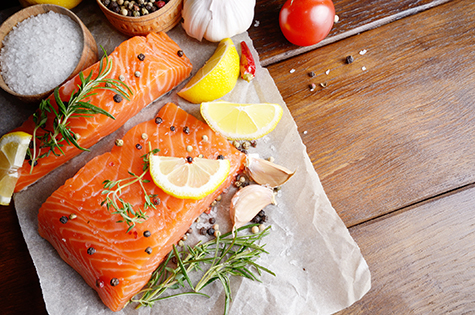Brain Boosting Foods

How many of us give much, if any, thought to keeping our brains in working order?
Think about it: Our brain and our heart are our two most vital organs.
If they stop working…we stop living.
But, while we’re inundated with information and advice about how to keep our cardiovascular systems purring, the gray matter inside our skulls is usually ignored — unless something goes horribly wrong.
Well, we thought, why wait until there’s a brain problem? Instead, let’s think ahead.
So, we asked a few Palm Beach County health experts for tips on maximizing brain health…
BRAIN-BOOSTING FOODS
Load up on DHA, EPA and ALA
Look for foods that contain lots of omega-3 fatty acids called EPA (eicosapentaenoic acid) and DHA (docosahexaenoic acid), recommends local certified health coach Pamela Higgins.
“These nutrients are essential for fetal brain development, as well as long-term brain health in preventing degenerative diseases like Alzheimer’s,” Higgins explains.
Among the EPA/DHA-rich foods Higgins recommends:
— Wild salmon
— Sardines
— Rainbow trout
— Herring
However, if you’re not a fan of seafood, there’s an alternative. “Eat foods rich in ALA (alpha-linolenic acid), some of which gets converted by the body into DHA and EPA,” Higgins says. Seeds, such as those from flaxseed and pumpkin seeds, are full of ALA.
Go for the good glucose
When your glucose (blood sugar) level drops, so does your brain function. According to Higgins, “You need about 130 grams of healthful, complex carbohydrates per day to help you stay alert and think clearly.” Maybe even more if you’re particularly active.
Higgins recommends filling up on the nutrient-dense, fiber-rich sources of energy found in fresh fruits, vegetables and whole grains.
Higgins favorite brain fuel? “Sweet potato. It provides slow-burning fuel for the brain, and plenty of nutrients, including Vitamins A, C, manganese, copper, potassium, and several B vitamins.”
In addition, Higgins urges you to consume plenty of leafy greens, such as kale, spinach and/or chard because they “promote good blood flow and are rich in antioxidants, which combat free radicals in your brain.”
DISEASE PREVENTERS
Dean Pagni, owner of the organic-food restaurant Fit Food Express in Delray Beach, notes the following foods are proven disease preventers and brain boosters:
Berries: “They’re full of memory-boosting nutrients and antioxidants.”
Cherries: “Nature’s little anti-inflammatories.”
Apples: “They contain a group of chemicals that could protect the brain from the type of damage that triggers neurodegenerative diseases like Parkinson’s and Alzheimer’s.”
Curry: “Turmeric, the yellow spice found in many curries, contains curcumin, which also has powerful anti-inflammatory and antioxidant properties.”
Cocoa: “Studies have shown that eating flavonol-rich cocoa can improve blood vessel function, boosting circulation and blood flow to the brain.”
EXERCISE
Move it — or lose it
Janine Tiede, the co-owner of Slobody Yoga in Delray Beach, knows that the mind and body are connected. That’s why she offers the following suggestions:
1) Get plenty of aerobic exercise. “The benefits include greater blood flow to your brain, improved mental focus and cognitive performance, a reduction in depression and, according to some studies, may prevent memory loss,” she says.
2) Vary your routines. Tiede cites the findings of Harvard psychiatrist Dr. John Ratey, who says that, when you exercise the body in new ways, it stresses the brain positively — perhaps even helping brain cells to grow.
3) Be conscious of your breathing. “With increased oxygen circulation comes improved mental clarity and overall relaxation,” says Tiede.
STAY CONNECTED — AND GET A PET!
Being around friends and loved ones helps keep your mind active, sharp and engaged. You know what also works? Getting a pet (or two … or as many as you can handle!).
According to veterinarian Dr. Benjamin Carter, of Signature Veterinary Care in Boca Raton, “Studies show that pet owners have fewer mental illnesses, and living with an animal can help you avoid dwelling on your problems. The stress release you get from spending time with your pet may even reverse the effects of depression.”
